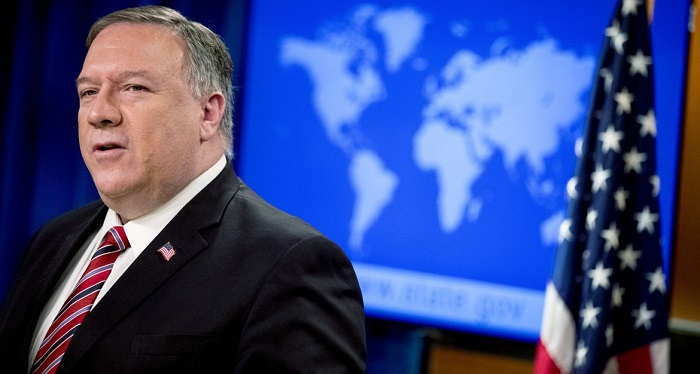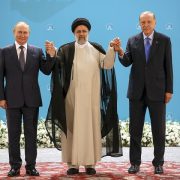
In his recent speech, US Secretary of State Mike Pompeo drove a knife right at the heart of the relationship between the Chinese Communist Party (CCP) and the Chinese people, crucial for the power of the CCP in Beijing.
Borrowing from the logic used by Mao Zedong in his On Contradiction, Pompeo tried to prove that CCP didn’t represent the Chinese people, and that actually the party is the enemy of the Chinese people. This point is fundamental because, as Mao put it, the crucial political element is to know who is with us and who is the enemy, and the party should always represent the people.
Pompeo stated: “We must start by changing how our people and our partners perceive the Chinese Communist Party. We have to tell the truth.”
What is the truth, according to the US secretary of state? It is that: “We know … that doing business with a CCP-backed company is not the same as doing business with, say, a Canadian company. They don’t answer to independent boards, and many of them are state-sponsored and so have no need to pursue profits… We know too that if our companies invest in China, they may wittingly or unwittingly support the Communist Party’s gross human rights violations… We know too too that not all Chinese students and employees are just normal students and workers that are coming here to make a little bit of money and to garner themselves some knowledge. Too many of them come here to steal our intellectual property and to take this back to their country.”
Therefore, he argues that the US should de facto work as a new revolutionary party: “We must also engage and empower the Chinese people—a dynamic, freedom-loving people who are completely distinct from the Chinese Communist Party.”
Because, he underlines, “Communists almost always lie. The biggest lie that they tell is to think that they speak for 1.4 billion people who are surveilled, oppressed, and scared to speak out. Quite the contrary. The CCP fears the Chinese people’s honest opinions more than any foe, and save for losing their own grip on power, they have reason—no reason to. Just think how much better off the world would be—not to mention the people inside of China—if we had been able to hear from the doctors in Wuhan and they’d been allowed to raise the alarm about the outbreak of a new and novel virus. For too many decades, our leaders have ignored, downplayed the words of brave Chinese dissidents who warned us about the nature of the regime we’re facing.”
Chinese dissidents are thus to be supported by the US as they really stand for the Chinese people, whose interests are in line with the interests of America.
This is a revolutionary American approach to China, using the logic of Maoism against Mao’s heirs, as all party members and Chinese people have been steeped for decades in Mao’s way of thinking, and consciously or not totally relate to this kind of reasoning.
Of course, there are differences between the definition and reality of the “people” of Mao’s times, when the basic contradiction was between the feudal society and the great mass of the people, and of present China.
The US and the CCP
Now Pompeo may have chosen the wrong people to support. Old dissidents like Wei Jingsheng or Wang Dan, who were especially invited and mentioned by the head of the US diplomacy, may have been out of the country for too long and may not command too much support within China.
But definitely the US tried to drive a wedge between the party and the people, and who will “truly” represent the Chinese people can come later. The important element is that the CCP has been de facto labeled an “enemy of the people.” This raises a huge host of problems for the party.
American backing for the CCP was always essential for the party. In the 1930s American journalist Edgar Snow’s Red Star Over China was extremely critical for convincing Westerners that the romantic Chinese communists were the guys to support rather than the corrupt nationalists of the KMT. His central claim, which may have come from Mao or might have contributed to Mao’s theory, was that the CCP really represented the hopes and aspirations of the common people of China.
When the communists came to power, the return of Chinese scholars from the US, like philosopher Feng Youlan or playwright Lao She, was indirect evidence of American support for New China. The rest, the anti-communist controversy raging in the US in the 1950s and 1960s, didn’t count, simply because China was shut down and Beijing’s official opposition to “American imperialism” sounded at times like a cry for help.
Later the homages to China by US presidents such as Nixon, Carter, Reagan, and Bush supported the idea that Deng Xiaoping and his successors were the true representatives of the Chinese people.
Now of course, forty years of miraculous economic development and President Xi Jinping’s massive anti-corruption drive have provided new ammunition to cement the party-people rapport in China. In fact, the support for the party was already very high and it has become even higher with the fight against the virus. The appeal of dissidents may be lost on many in China who saw their lives improving, the corruption brought under control, and very importantly the epidemic dealt with, at least prima facie, more efficiently in China than in the United States.
But the US wedge is a probing tool. It can reveal where there’s strength and where there are weaknesses, and the next practical move may be more successful.
Externally, Pompeo made another issue clear. The US is no longer taking a bilateral approach to China. The US is telling its partners the CCP is lying and thus it is building a coalition of like-minded countries against the CCP. This may have long-term global impact.
This is the first modern war focusing on Asia.
World War I was mostly in Europe and Asia, with Japan’s role against German colonies in China a minor sideshow. World War II was also mainly in Europe, and Japan’s attack on China and the US was important, yet the more significant war was in Europe. During Cold War 1, Asia was important, with the hot wars in Korea and Vietnam, and the violent crackdown on communist insurgencies in Malaysia and Indonesia. But the soviet capital, Moscow, was in Europe. Now Asia is the center of the conflict for the first time, although the clash may spread to other continents. Then China may want to extend its global footprint, whereas the US may want to shrink it. But the main arena is the Pacific, Asia.
Money talks
Moreover, the United States and the European Union are throwing trillions of dollars at their economies. It is about to be the largest financial aid in the history of capitalism, possibly bigger than the Marshall Plan that helped rebuild the European economy after World War II. This time it could relaunch and recreate the world economy after the end of the coronavirus epidemic, possibly also according to different parameters. This massive plan will occur as the US is decoupling from China’s economy, and it is drawing Europe with it. In this way, it looks like China will be excluded from most of the positive impact of this massive program.
It is not clear what the money will actually do. Will the US start a massive industrial program to revamp its system by investing in badly needed new technologies, fresh infrastructure, health care, education, and legal and bureaucratic simplification to spur new business.
What will the EU do? Coordinate with the US? Coordinate at a continental level or distribute funds to each country to spend as they please? None of this is clear, and it might not be until after the US presidential elections. It is clear that in a military coalition made of Japan, Vietnam, India, Australia with American assistance, will it become also an economic and trade cooperation area, as the Obama administration envisaged? Not clear.
But it is clear that plans will only marginally interest China if not outright exclude China. Hence this could help create two separate economic spheres with or without the US, like at the time of the Marshall Plan. The prospect of facing the post-coronavirus economy alone—plus Pompeo’s declaration of ideological war against the CCP—should give pause to the Chinese leaders and make them think of ways to get out of the hole they are presently in.
We shall see in the next few months what they will do.






Do you really think Mr Pompeo is the first American government official to say, or believe that the CCP does not speak for the Chinese people? I’m pretty sure half the world believes it, and furthermore the CCP knows it, and it’s exactly why the entire country is censored. Support from outside the Chinese bubble is exactly what the CCP fears.
The entire South China Sea region lives in fear of the bully called China, but they jumped on board pretty quick when America sailed two aircraft carrier battle groups into the South China Sea… which are international waters. There was no coercion… they jumped.
Spoken like a true communist.